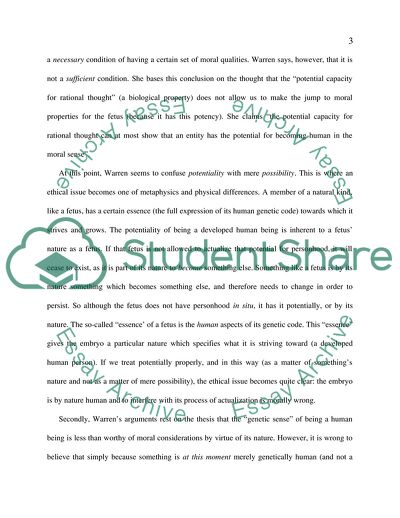
- Home
- Free Samples
- Premium Essays
- Editing Services
- Extra Tools
- Essay Writing Help
- About Us
- Studentshare
- Subjects
- Miscellaneous
- Ethical Argument
Ethical Argument - Essay Example

- Subject: Miscellaneous
- Type: Essay
- Level: Masters
- Pages: 4 (1000 words)
- Downloads: 0
- Author: alizekirlin
Extract of sample "Ethical Argument"
follows from these premises is that the right to an abortion is absolute through all cases, and that no legal restriction on that right is philosophically justifiable. However, where it seems Warren’s arguments come off the track is right in the beginning, with her supposedly “overlooked” distinction between “human in the moral sense” and “human in the genetic sense”. This false dichotomy relies on two untenable theses: that (1) a human being is separable into distinct properties called “moral” and “biological” respectively, and that (2) the “genetic sense” of being a human being is less than worthy of moral considerations by virtue of its nature.
In defining the “moral community”, Warren offers five criteria for moral consideration as a person. These principles place a living being in either of two categories: “human in the moral sense” and “human in the genetic sense”. The “moral” sense of being human is that which is a human person, according to Warren, and abortion applies only to those beings which are not instances of this particular category. This makes it excusable to end the life of a human being which is only so in the “genetic” sense.
However, this rests on the assumption that we can metaphysically separate the properties of single beings into dichotomous categories like Warren proposes. We cannot because, for a human being, having a certain set of biological properties is a necessary condition of having a certain set of moral qualities. Warren says, however, that it is not a sufficient condition. She bases this conclusion on the thought that the “potential capacity for rational thought” (a biological property) does not allow us to make the jump to moral properties for the fetus (because it has this potency).
She claims “the potential capacity for rational thought can at most show that an entity has the potential for becoming human in the moral sense”. At this point, Warren seems to confuse
...Download file to see next pages Read MoreCHECK THESE SAMPLES OF Ethical Argument
Ethical Argument (Should Roe Vs. Wade be overturned) Should Abortion be outlawed
Comparison Peter Singer's and Garrett Hardin's Positions on Helping the Poor
Ethical Argument Paper
Provide an Ethical Argument against the Use of Dolphins in the US Navy for Military Purposes
Ethical argument-Abortion
Ethical Argument of The Omnivore's Dilemma
Legalizing Physician Assisted Suicide

- TERMS & CONDITIONS
- PRIVACY POLICY
- COOKIES POLICY